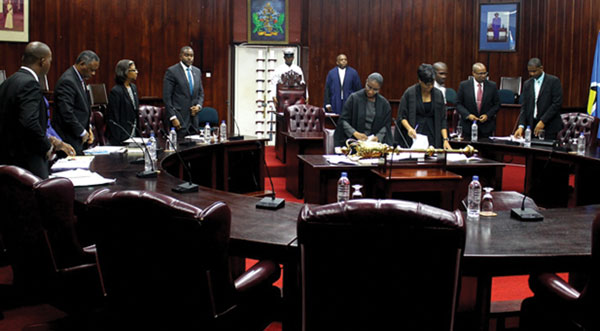THE Senate met last Thursday for its first session of business since the opening of the Eleventh Parliament of Saint Lucia.
President, Andy Daniel, began the session by urging the eight of the eleven senators present to make the stint “productive” and to “maintain a high level of debate and discourse”, adding that their immediate predecessors had set a high standard.
“The last Senate got much praise and you will be compared to the last Senate. I do hope you maintain that level of discourse,” Daniel warned.
Twenty-one papers were laid by the Minister in the Ministry of Finance and Leader of Government Business, Dr.Ubaldus Raymond, and one by Minister in the Ministry of Agriculture, Jimmy Henry, including Statutory Instrument No. 54 of 2016 Elections (Extension of Time) Order, and Statutory Instrument No. 55 of 2016 Price Control (Amendment).
Three motions were also tabled by Dr. Raymond, including one seeking Parliament’s authorization for the Minister for Finance to borrow by means of advances sums not exceeding $55 million dollars from commercial banks, for a period of six months from the date hereof, which sums shall be charged upon and paid out of the Consolidated Fund.
The commercial banks named by Dr. Raymond for such financing were RBTT/RBC, FirstCaribbean/CIBC, Bank of Nova Scotia, 1st National Bank and Bank of Saint Lucia.
Opposition senators, Joachim Henry and Guibion Ferdinand, expressed concerns that government might be increasing its debt value by rolling over its debt, especially since no interest rates were provided by the government relating to that rollover.
However, Dr. Raymond said government would essentially be converting its short-term debt instruments into longer term debt instruments.
“What that will do is free us from paying on the huge monthly and yearly interest and further our payment period and at the same time reduce our monthly and yearly interest payments,” Dr. Raymond said.
Dr. Raymond said Saint Lucia debt stock profile paints an “alarming and shocking” picture due to much of that debt being in short-term instruments, resulting in cash flow being under difficult pressure as these short instruments have to be rolled over every 90 days. He said that government has decided to convert these short-term debts into longer term debt.
“So the ‘extra money’ from our cash flow which would have gone into the interest payment for the shorter term instruments will be deposited into the sinking fund,” Dr. Raymond stated.
He added: “Unfortunately, our sinking fund has sunk because there’s no money in our sinking fund. That’s the reason why we have a reissuing of debt every time it matures. So my government is going to replenish the sinking fund so that when our debt matures, we will have these monies set aside to pay down that debt.”
Dr. Raymond said government will adopt the amortization method of paying its debt, whereby both principal and interest will be paid simultaneously. The norm over the years was that government paid interest on debt and then the principal. He said amortization is a better method because when the debt would have matured, both principal and interest would have been paid off, resulting in a reduced debt stock.
Another motion that Parliament authorizes the Minister for Finance to reissue the sum of US$29 million through ECFH Global Investment Solutions Ltd., was voted on and passed.
The third motion, that Parliament authorizes the Minister for Finance to raise EC$80 million and US$13 million for refinancing existing debt, was also voted on and passed.
Dr. Raymond said the EC$80 million will be reissued in tranches: EC$50 million (on September 2, 2016 for a10-year tenure at 7.5% interest rate) and EC$30 million (in November 1, 2016 for a five-year tenure at 6.8% interest). The repayment structure will be via amortization, he said.
The motion was voted on and passed.
The Inter-Governmental Agreement (Saint Lucia and the United States of America) Bill went through committee stages without amendments and was passed while the Money Laundering (Prevention) (Amendment) Bill had its first reading with the second reading adjourned to the next sitting of the Senate.
The sitting was adjourned after just over an hour of business.







![Attendees at the UHC logo and website launch [Photo credit: GOSL]](https://thevoiceslu.com/wp-content/uploads/2026/02/Attendees-at-the-UHC-logo-and-website-launch-380x250.jpg)






![Remnants of an alleged drug boat blown up in a lethal strike by the U.S. military last week surfaced off Canouan on Saturday [Photo credit : St Vincent Times]](https://thevoiceslu.com/wp-content/uploads/2026/02/Remnants-of-an-alleged-drug-boat-blown-up-380x250.jpg)
